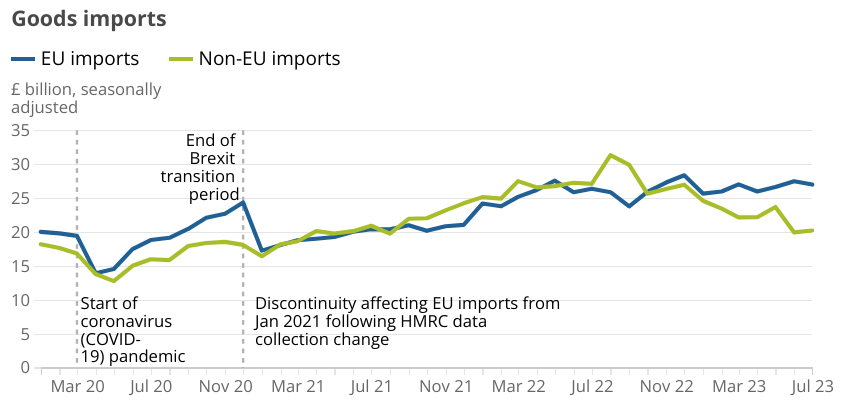UK exports to EU increase in July but services still stagnant

The UK saw a “steady” expansion in exports of goods to the EU in July but the services sector saw continued stagnation, official trade data released today showed.
According to the Office for National Statistics (ONS), exports to the EU increased by £500m in July thanks to a £400m increase in fuel exports — mainly to the Netherlands and France — and a £200m increase in machinery exports, mainly to the Netherlands.
This was partially offset by a £100m in ‘miscellaneous manufactures’.
While rising fuel and machinery exports boosted trade with the EU, stuttering growth in China and US led to a fall in fuel exports. In total the value of goods exported rose 0.8 per cent in July.
Imports from the EU declined 1.8 per cent in July as the UK brought in fewer organic chemicals from Ireland.

Increased imports of crude oil from Norway caused imports from non-EU countries to climb 1.4 per cent, but this only partially offset the fall in EU imports.
Although rising goods exports brought cause for cheer, William Bain, head of trade policy at the British Chambers of Commerce said there was cause for concern in the continued downturn in services exports.
“A key concern is the continued slowdown in momentum in UK services exports growth – which accounts for just under half of our overseas trade,” Bain said.
In the three months to July, export of services fell 2.9 per cent compared to the three months to April.
This means UK services exports are still 2.9 per cent lower than at the start of the Covid lockdowns, when adjusted for inflation.
Post-Brexit the government has been attempting to sign trade deals with countries around the world to boost trade.
So far it has signed three new trade deals. Recent comments have suggested the UK is close to signing a trade deal with India — although Prime Minister Rishi Sunak said there’s still “a lot of hard work” to do.
Bain highlighted that the importance of forging new trading partners has only been heightened by the growing trend of ‘deglobalisation’, with many countries putting up barriers to trade for security reasons.
“As the World Trade Organisation’s World Trade Report this week warned of the global economic consequences of moving away from open, free trade, we must redouble our efforts to open up markets for UK goods and services,” he said.